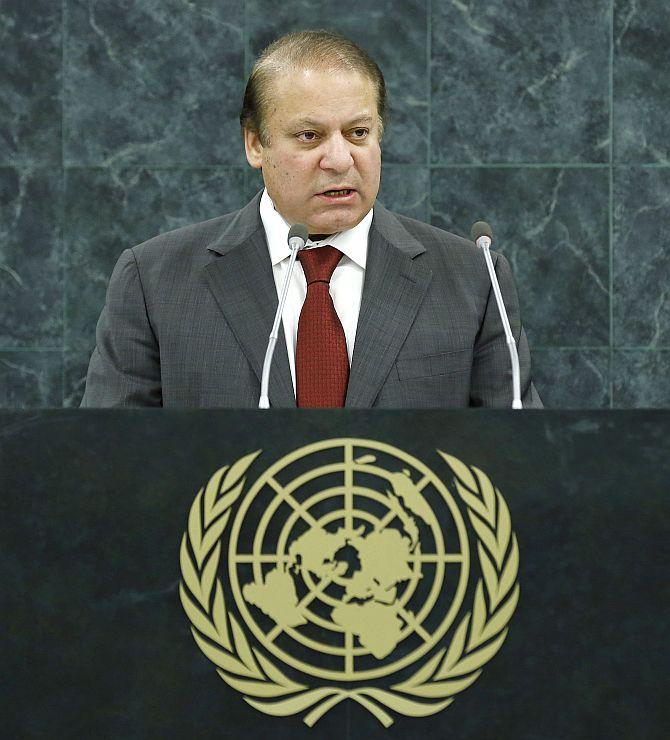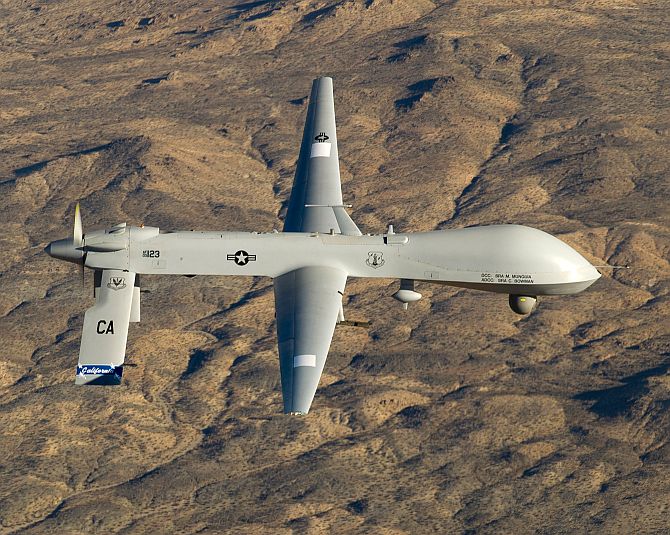 | « Back to article | Print this article |
Sharif plays good cop, bad cop with India @ UN
Even as Pakistan Prime Minister Nawaz Sharif asserted that he is ready to re-engage with India in a substantive and purposeful dialogue, he did not lose the opportunity to rake up Islamabad’s oft-stated stand on plight of Kashmiris across the border. Suman Guha Mozumder reports
Pakistan Prime Minister Nawaz Sharif on Friday raised the issue of Kashmir during his address at the United Nation General Assembly, urging the international community to give an opportunity to the Kashmiris to decide their future peacefully in accordance with the United Nations Security Council resolutions of 1948.
‘The United Nations must continue to remain attentive to the issue of Jammu and Kashmir and the full realization of the right to self-determination of its people. The suffering of the people cannot be brushed under the carpet, because of power politics,’ Sharif said.
The issue of Jammu and Kashmir, he said, was presented to the Security Council in January 1948 and yet the issue remains unresolved after nearly seven decades.
On terrorism, Sharif said that Pakistan is resolved to oppose the forces of terrorism, by all means at its disposal.
‘At the same time, we have offered dialogue to end violence, wean young extremists off extremism, and integrate all segments of our society into the national mainstream,’ he said.
Click on NEXT to read further...
Sharif plays good cop, bad cop with India @ UN
‘Winning hearts and minds, particularly of the youth, is as important as using guns to deter terrorism. But dialogue should not be seen as a sign of weakness or a tool of appeasement,’ the Pakistan Prime Minister said, apparently in a jibe to India that has slammed Pakistan for the cross-border terrorism but has also agreed to bilateral talks with Islamabad.
Sharif said he was looking forward to meeting his Indian counterpart, Manmohan Singh in New York on September 29 to make a new beginning in the bilateral relation and to re-engage with New Delhi in a ‘substantive and purposeful dialogue.’
He said that shortly after assuming office, he received a message of goodwill from Dr Singh after which he extended an invitation to the Indian Prime Minister to engage with Islamabad to address all outstanding issues between the two countries.
Dr Singh’s response, he said, was positive.
‘Our two countries have wasted massive resources in an arms race. We could have used those resources for the economic well-being of our people. We still have that opportunity. Pakistan and India can prosper together; and the entire region would benefit from our cooperation. We stand ready to re-engage with India in a substantive and purposeful dialogue,’ the Pakistani Prime Minister said.
He noted that the two countries have a solid basis to make a new beginning.
‘We can build on the Lahore Accord signed in 1999, which contained a road map for the resolution of our differences through peaceful negotiations. I am committed to working for a peaceful and economically prosperous region. This is what our people want and this is what I have long aspired for,’ Sharif said.
Click on NEXT to read further...
Sharif plays good cop, bad cop with India @ UN
The Pakistan Prime Minister also talked briefly about Afghanistan, saying that Islamabad supports an inclusive, Afghan-led and Afghan-owned peace process, leading to national reconciliation.
‘I re-assured President Hamid Karzai that we do not wish to interfere in Afghanistan's internal affairs; nor do we have any favourites in that country. In fact, we have an earnest hope that the Afghans themselves will unite for peace, prosperity and development of their great country.
Pakistan encourages, he said, United Nations’ efforts for the stabilization of Afghanistan.
‘We will work together with Afghanistan for regional and economic cooperation’ that would establish and reinforce regional trade, energy and communications corridors.
‘A manifestation of our solidarity with the Afghan people has been our willingness to host millions of Afghan refugees in Pakistan for many decades. International support for their repatriation as well as reintegration in Afghanistan is indispensable.’
In an apparent criticism of the United States, Sharif said that the war against terrorism must be waged within the framework of international law.
‘The use of armed drones in the border areas of Pakistan is a continued violation of our territorial integrity. It results in casualties of innocent civilians and is detrimental to our resolve and efforts to eliminate extremism and terrorism from Pakistan. I have urged the United States to cease these strikes, so that we could avert further casualties and suffering,’ he said.
Sharif also called for an immediate stop on stereotyping of Muslims as extremists and terrorists.
‘We must all use the influence and reach of the United Nations to avert a clash of civilizations and promote harmony among followers of diverse religions, all around the world. Terrorism negates Islam's humanistic outlook and noble values. Those who perpetrate terrorism are enemies of Muslims and Islam itself.’


